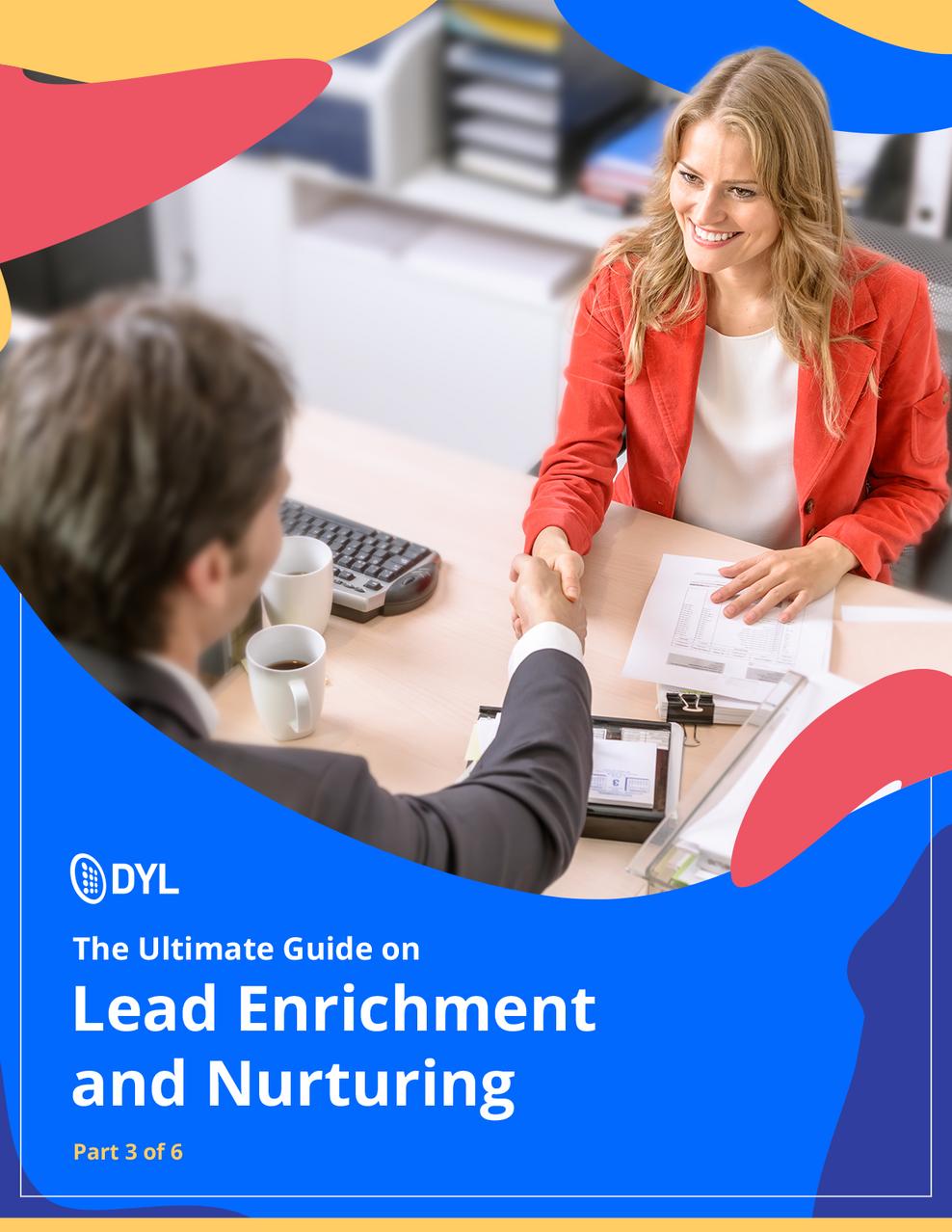

Introduction

Impact of Lead Enrichment
Throughout your sales process, it’s important to confirm lead information so you can move them faster through your funnel WIthout the use of accurate information, you might waste time on uninterested leads or even worse: you might miss a few leads that are ready to buy your product or service right away. That’s why companies are using a process called Lead Enrichment or Lead Nurturing to make sure their sales team is set up for success.
Throughout this eBook, we’re going to explore how lead enrichment and nurturing can speed up your sales process, increase lead acquisitions throughout your entire sales funnel, and improve your marketing conversions to sales qualified leads.

The Start
What is lead enrichment?

Lead enrichment is the process of adding accurate information to a lead so you can easily qualify or distribute the lead to your team members
Lead enrichment is part of the marketing and sales process, and it often goes hand in hand with qualifying leads.

If you haven’t gotten a chance, check out our lead qualification process so you know more about qualifying leads with the correct information.
Here’s why lead enrichment is so important:
Lead enrichment cuts back on the amount of time your sales team spends on researching lead information. Often, this results in hours of lost productivity and a sales team that is ready to give up.
That’s why it’s important to either have an automated process in place, or use a software that can give you the information you need to qualify incoming leads.
The enrichment process also increases the revenue you make from each lead in your sales process

Because you’ve cut back on the amount of time spent on the lead, you spend less per each qualified lead acquisition. That means less money spent to create a lead. So when you close a sale, you gain more revenue because you’ve spent less.
Another very important part of the lead management process that goes hand in hand with lead enrichment is lead nurturing.
What is lead nurturing?
Lead nurturing is the process of growing the relationship between you and a prospective buyer at every stage of the sales process. Often, successful lead nurturing requires three core processes to strengthen your relationship: building trust, creating brand awareness, and maintaining a quality connection until your buyer is ready.

With more than 50% of leads not ready to buy at any given moment, it’s important you’re there as a resource and have a strong relationship between you and your prospective buyer.
Lead nurturing also goes hand in hand with a lead scoring system, so if you haven’t gotten a chance to read our lead scoring process, click here.
Why is lead nurturing vital to success?

On average, lead nurturing improves the sales process speed by 50% and it improves the quality of sales ready leads by 33%. That means you’re spending 50% less resources to convert these leads and receive 33% more leads that are ready to buy. Lead nurturing not only cuts down on cost, but also improves your bottom line.

What should you look out for in your sales process

According to account based marketing insights, only 22% of B2B businesses reach out to prospects with a lead nurturing process on a weekly basis.
If you’re a business that barely reaches out to prospects before your sales team hops on a call, then you’re wasting time and using resources inefficiently
More often than not, prospects want to know about your company through marketing materials before they convert to a paying customer.
If you are not actively using a lead nurturing process or lead enrichment process, it’s time to reconsider your decision
The lead nurturing process will make it easier for your sales team to talk with prospects, because your marketing team has done a bit more heavy lifting work.
With a lead nurturing process in place, prospects are more likely to engage with marketing materials, get familiar with your brand, and understand why they should consider your company versus being convinced over the phone.
A lead enrichment process enables your sales team to expand conversations and it’s easier to problem solve in real time because they already know why prospects are part of your sales funnel.

How lead enrichment works The Know
Today, the lead enrichment process involves multiple key members as part of the sales and marketing process The enrichment process first begins with:


1 SDR - Sales Development Rep
This inside sales member analyzes data from your sales tool, often in the form of a CRM, and focuses on the prospecting side of lead enrichment. This is where they decide which inbound leads should move forward in your sales process. They often contact these leads by email, call, fax, or text
Sales Development Representatives often focus on top of the funnel leads and move them through to the next stage, where either the account executive or business development representative talks to them about purchasing the product or service.
2 BDR - Business Development Rep

This is also an inside sales member, but they work with outbound leads versus inbound. They are typically the sales representatives that the public knows the ones that try to develop new business relationships and meet with companies that don’t know their business exists.

Typically, BDRs go to the marketplace by doing market research, reach out to new leads via cold calling, email campaigns, or attend events They are also known to reach out to larger or more important clients.
3 AE - Account Executive
This is the sales member at the lowest point of the sales funnel, or right at the end. They are the people who handle the closing process and receive handoffs from both the BDR and SDR Account Executives typically have end of the line content prepared and they are the ones who send contracts and where negotiations begin. They also maintain the client, sometimes they onboard them to the platform, and try to upsell or cross sell different products to the business. Once they’ve gone through the process, they hand off leads to an account manager.
How lead nurturing works The What
Lead nurturing helps you build personalized B2B relationships with potential buyers throughout your sales process. Lead nurturing is often paired with lead scoring, where you can rate leads based on the level of interest of your business which is recorded by how often they engage with content.
The Strategy 1 Lead Scoring
Based on our previous eBook on lead scoring, you can create a system where sales and marketing can come together to move leads along your sales and marketing funnel. At the beginning, you should always start with a few things:
Demographics: Who are they? What is they company like? Are you talking to the right person at the company

BANT, ANNUM, MEDDIC, CHAMP, or a similar process
Lead Stage: What content are they engaging with? What stage are they at?
Lead behavior: How are they engaging with your company? Only through content? Or other means?

Next Step
Proven Lead Nurturing and Lead Enrichment systems to get results

Developing a lead nurturing and enrichment plan can be very difficult if you don’t know where to start. A good place to begin is by answering a few simple questions:
TheUltimateGuideonLeadEnrichmentandNurturing

Do you have a sales process?
Does it start with marketing? Or do sales have a different process entirely?
Do you have an SDR? Do you have a BDR? Do you have an account executive?

If you’re missing any one of these, you should add them to part of your process.
Do you have a marketing process?
Does your marketing team hand over leads to your sales team? Do you serve content at each stage of the funnel?
How does marketing impact the sales process?
If it doesn’t, consider adding marketing content to part of your sales process for both BDRs and SDRs.
Do you have a lead nurturing plan in place?
If not, you should reconsider adding a lead nurturing plan. This can cut down on costs and improve the quality of your leads.
If you answered “no” for any of the above questions, you should consider restructuring your process. A proper marketing to sales process with built-in enrichment and nurturing can lead to more conversions, less costs, and better engagement with leads.
Once you’re done answering these questions, below is a plan that you can use to optimize your lead nurturing process and improve sales and marketing

Every company needs a plan. The most important part of the Lead Enrichment and Nurturing process is to come up with a strategy and use that to fuel later actions.


If they’ve interacted with any of the above emails, 4 times, then they should be passed onto sales
Sales Process:
1. a. b. c. d. e. f. g. h. i. i. 2. 3. 4. 5. TheUltimateGuideonLeadEnrichmentandNurturing

Call the prospect and find out where they’re at in your sales funnel
Ask them to tell you about their company
Ask them to tell you about their role, what do they do day to day?
What metrics are they responsible for? What are their goals?
What problems are they trying to solve? What tools are you using right now? Are you satisfied with those tools? Ask questions that will qualify or unqualify your prospect. These will be around Budget, Authority (who they are), timeline, and other important information.
Establish next steps.
Immediately, Send eBook about your niche, right after the call. This eBook should highlight your product or service and should be a quick read.
Wait a day, Send Blog Article or whitepaper that will help convert.
Wait a few days, Send any marketing that will help convert. Reach out to them the following week via call.
A simple process like the mentioned above will make your process easier and you can nurture leads in a repeatable process The idea is to make your sales representative’s life easier and marketing’s life easier by using a standard operating procedure
As you continue to develop your plan, it’s important that you keep track of performance through testing and monitoring.

Testing and Monitoring Performance Indicators
We recommend you have at least 40 leads go through your sales and marketing funnel. After you’ve had enough leads go through your nurturing and enrichment process, you have enough data to make better decisions.

A few questions you should answer include:
After leads went through your marketing funnel, did they seem open to talking with your sales team?
TheUltimateGuideonLeadEnrichmentandNurturing

If not, what could you improve to make them more open to speaking with a sales representative?
If yes, is there anything you could add to get more quality information before they’re handed off to your sales team?

Before your initial meeting, were leads responsive to emails sent from your sales staff?
If not, what was making them unresponsive?
If yes, were leads reading to speak after the initial email was sent from your sales staff or were they hesitant to speak with your sales team?
During your first sales meeting, were leads answering questions?
If not, what else could you have sent them to make them feel more comfortable to open up?
If yes, did they answer all your questions?
If not, It’s possible there’s a piece of content that would have made the conversation flow better.
During your marketing process, what could you have done differently that would have led to better results?
During your sales process, what could you have done differently that would have led to better results?
These are a few great questions that will provide you with better insight about how to improve your sales and marketing process. As you get further into your process, it’s best to look at other strategies that might improve your overall success.
TheUltimateGuideonLeadEnrichmentandNurturing
Key Metrics

One of the most important things you can do to improve your lead enrichment and nurturing process is tracking data. This means tracking certain statistics, numbers, and reasons why you were successful or unsuccessful.
Here are a few key metrics you can track during your lead nurturing and lead enrichment process. Marketing Metrics:

Percent of Monthly Leads Created from Marketing Campaigns
Number of Marketing Qualified Leads vs Sales Qualified Leads
Email Unsubscribe Rates
Campaign Conversion Rates from Marketing to Sales
Average Marketing Cycle Length
Sales Metrics:
Email Open Rate
Email Click Through Rate
Sales Qualified Content Downloads
Average Sales Cycle Length
Percent of leads willing to have a conversation with a sales representative Percent of leads who answer your questions during a sales call
There are many more metrics you can track for both your sales metrics and marketing metrics, but this is a good starting point to improve your lead enrichment and nurturing process
Conclusion
The lead enrichment and nurturing process is vital to the success of your marketing and sales efforts. Without a process to improve data given to your sales team, you might miss a few key pieces of information that can unqualify or qualify incoming leads. This means you can remove unqualified leads or prioritize leads who are more likely to convert to a customer.
During the lead nurturing process, you can improve relationships through marketing and sales content Once you’re able to understand what your leads want, it’s easier to serve content that will help increase conversions. As you complete your plan, testing and monitoring will continue to reward your company with new ways to improve your system.
TheUltimateGuideonLeadEnrichmentandNurturing


